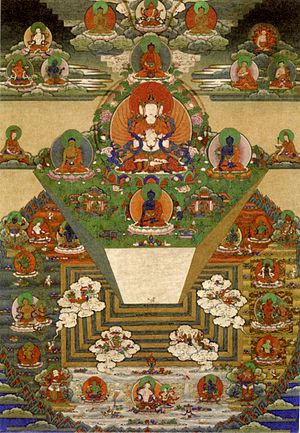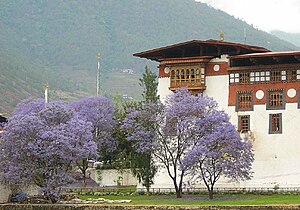 |
| Gross National Happiness, Bhutan: an alternative to GDP inspired by Buddhist principles. (Photo credit: iied.org) |
 |
| Bhutan (Photo credit: babasteve) |
Please forgive me: I’m a Hungarian ‘chilip’ who doesn’t permanently live in Bhutan and I’m not a GNH expert. However, I dare to offer some additional thoughts to the healthy discussion provoked by Dr David L Luechauer in The Bhutanese hoping to contribute to Bhutan’s future development.
Some of you may think I am trying to defend GNH and Bhutan against critics. This is not the case, because GNH or Bhutan doesn’t need my defense and protection. Personally, I can’t see any problem with Dr David criticizing the GNH practice without knowing the concept well while relying on his personal and limited experiences. I keep hearing from my Bhutanese friends that he probably did a good service to Bhutan when raising some valid points. He may even be right saying that widespread domestic practice should have predated any extensive international promotion. I can’t really judge.
What I know for sure though is that GNH provides inspiration to many people outside Bhutan, including my friends in Europe, who explore alternative ways of organizing our societies. I say ‘inspiration›’which doesn’t mean that we would like to take GNH into our countries as it is. No, we want to study the concept, see the results and challenges in Bhutan, and then figure out what we can learn from it and how we can apply the findings. Doing so, we also hope to help Bhutan improve and apply GNH.
In my article, I hope to add new dimensions to the conversation by focusing on three things: 1) the universal gap between theory and practice; 2) proposed solutions to Bhutan by Dr David and their viability; and 3) the business sector’s role in further developing Bhutan.
 |
| English: Tashichho Dzong, Thimphu, Bhutan. It is a Buddhist monastery and seat of the Druk Desi, the head of Bhutan's civil government. Français : Le monastère fortifié de Tashichho Dzong, à Thimphu, au Bhoutan. Le Tashichho Dzong est le siège du Druk Desi, chef du gouvernement civil du Bhoutan. (Photo credit: Wikipedia) |
The Theory Vs. Practice Gap
I don’t know Dr David, but he may have fallen into the trap several ‘chilips’ did before: prior to his arrival, in his mind, he may have constructed his own Shangri-la or Happiness State with ever-smiling citizens governed by an enlightened policy called GNH. Then, he got disappointed when he found a real country with real people struggling with real everyday problems. And then he concluded that his home country is still much better.
When I was 18 years old I fell into the same trap, but my constructed Shangri-la was the United State. I was living in Hungary in Eastern Europe under a ‘light communist’ regime and for my birthday I received a Big Mac from one of my best friends. He queued for hours in front of the first newly opened McDonald›s in the country and I still remember the thrill I had just looking at this small piece of food on the dinner table. It was a precious sacred object, much more than a sandwich. For me, it was the American Dream itself.
 |
| Bhutanese thanka of Mt. Meru and the Buddhist Universe, 19th century (Photo credit: Wikipedia) |
This happened in 1988 and two years later we had democratic elections and open market and later I got my dream job at Levi’s, the American jeans company. Today, I laugh when I recall the Big Mac story. Since then, I have grown up and learned to see the difference between the American Dream and a hamburger. In other words, I know the difference between marketing and reality. I know that the American Dream, which is globally marketed by brand builders, politicians, Hollywood and many US citizens, is not fully practiced in its home country neither. I›ve been there and I›ve seen it. It›s a political slogan or a well-promoted philosophy, if you wish. Just like the ‘Free Market Economy’ which doesn’t exist anywhere due to government’s intervention, protection and subsidies, big business monopolies, and human nature.
 |
| Bhutan | Old meets new in Thimpu (Photo credit: simonjp) |
 |
| LONDON, ENGLAND - AUGUST 01: Sherab Zam of Bhutan competes in her Women's Individual Archery 1/32 Eliminations match against Khatuna Lorig of United States during the Women's Individual Archery on Day 5 of the London 2012 Olympic Games at Lord's Cricket Ground on August 1, 2012 in London, England. (Image credit: Getty Images via @daylife) |
And this discrepancy between a well-rounded concept and rugged reality naturally applies to GNH, too. And that’s fine. I am afraid that we, adults, have to accept that GNH and the American Dream are both aspirational concepts of great minds which are marketed by talented political leaders at home and abroad, while imperfectly implemented anywhere.
Considering this, one may ask how come that US politicians and Dr David are promoting the concept of American Dream or Free Market Economy or Equality or Democracy across the globe if they are not fully practiced at home? How about gun violence, crime, unemployment, homelessness, obesity, environmental degradation, stress, depression, drug and alcohol abuse, debt, high military spending, increasingly limited social mobility, money-driven politics, anti-market government subsidies, stagnating middle-class income, and growing gap between super-rich and the rest of the US? The US is no longer what it used to be. Shouldn›t they just get their own house in order first before trying to sell their concepts to the world?
 |
| English: Dzong (fort) in Punakha (a place name) in central Bhutan. (Photo credit: Wikipedia) |
You might be surprised, but I think they shouldn’t. I think Americans and Europeans – including Dr David – have the right to promote whatever values, concepts, ideas and philosophies they think are right - regardless of their implementation. It can be the American Dream, Free Market Economy, Democracy, The Invisible Hand, Individualism, GNP, Well-being, Christianity, Human Rights, Peace&Love, Tree Hugging, Philanthropy or Superman. These constructions of the mind are all imperfect when practiced, but still it’s worth globally debating their viability and implementation.
On the other hand, all men and women are born equal, not only Americans or Europeans. If Dr David has the right to promote his values and criticize those of others – and I strongly believe he has – others have the same right, too. We all have the right to explore alternatives or adjustments to the American Dream, Baker&McKenzie, IMF, Hollywood, or Wall Street without immediately being labeled as communist, Marxist, fundamentalist environmentalist, anti-capitalist, or anti-Superman.
 |
| Trip to Bhutan (Photo credit: Chris Guillebeau) |
And I believe that GNH as a concept is potentially one of the many viable alternatives to our current global socio-economic system in crisis. Again: it’s worth discussing it as a concept globally among many others even in more developed countries regardless of its implementation in Bhutan.
But, as Dr David rightly suggested, we shouldn’t get stuck in discussing philosophy too much, but let’s pull up our sleeves and get to work.
On Dr David’s Proposed Solutions to Bhutan
Going beyond his personal insights about GNH implementation and Bhutan’s economic and social challenges such as alcoholism, I reviewed what Dr David was actually proposing to the Bhutanese and I had a hard time to find his solutions either original or applicable or fair. Some seem to make perfect sense like hard work or better public toilets or curbing alcoholism. Others are less convincing. Given our limited time, I just want to comment on some of his controversial proposals:
1. His Proposal: Bhutanese should get to Hard Work to Build the Economy and Infrastructure.
 |
| English: "Gross National Happiness is more important than Gross National Product" by Jigme Singye Wangchuck, king of Bhutan. Slogan on a wall in Thimphu's School of Traditional Arts (Photo credit: Wikipedia) |
I think Bhutanese farmers work hard enough to be appreciated. I think Bhutanese craftsmen work hard enough to be appreciated. I think Bhutanese doctors, forest engineers, teachers, shoe cleaners, tourist guides, taxi drivers, etc all work hard enough to be appreciated. Constructing roads, buildings, and hydropower stations in Bhutan is mostly done by Indian companies with Indian workers. They have the technology and willing manpower Bhutan lacks, so they are contracted to build. I don’t see it as a problem, if properly managed.
Building an economy takes not only hard work, but time, money, natural resources and favorable trading opportunities. And protection against cheap and or better foreign products until the domestic industry is strong enough to compete. This complex process requires much more than the ‘Just do it’ attitude.
(Reproduced from The Bhutanese)
To be continued
The writer used to work for Levi Strauss and he’s currently an independent Corporate Responsibility Advisor in Europe and a volunteer business coach in Bhutan. He’s also founding president of the Hungarian Bhutan Friendship Society. He can be contacted at valcsicsak.zoltan@gmail.com
>>>Come Discover The Magic








